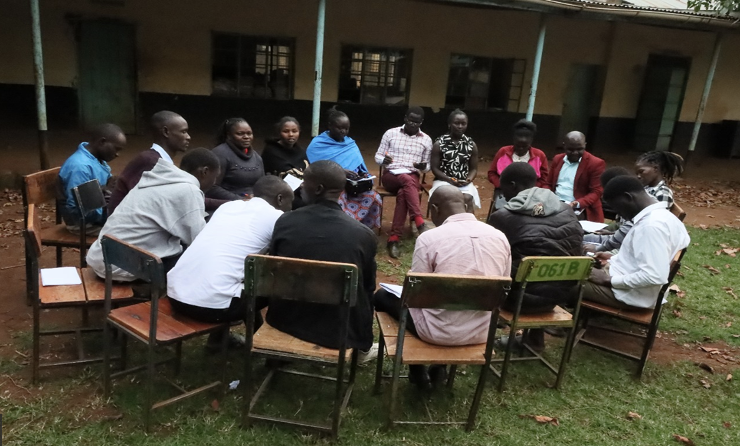Climate Change Grassroot Champions
By: Edna Kowenje, Humphrey Agevi, Florence Onyango
The Lake Region Economic Bloc (LREB) in Kenya, a vital economic hub comprising 14 counties, is increasingly grappling with the severe consequences of climate change. From erratic rainfall patterns to rising temperatures and more frequent extreme weather events, the region faces a multitude of challenges. These impacts are particularly devastating for the predominantly rural population, whose livelihoods depend on climate-sensitive sectors like agriculture and fisheries. Declining agricultural yields, reduced fish stocks, and other adverse effects are threatening food security and exacerbating poverty in the region. A recent report by the Intergovernmental Authority on Development (IGAD) highlights the urgency of addressing these issues, especially for pastoral communities, who often share similar challenges to those in the LREB.
To effectively mitigate the growing climate risks in the LREB, localized adaptation strategies are essential. Given the region’s diverse ecological, social, and economic characteristics, a one-size-fits-all approach is unlikely to be successful. Locally-led Adaptation (LLA) emerges as a transformative solution, empowering communities to devise and implement climate solutions tailored to their specific needs. A comprehensive study by the Global Commission on Adaptation emphasizes the importance of LLA in building resilience, particularly for vulnerable populations.
Empowering local communities through climate change education and capacity-building initiatives is crucial for the success of LLA. Knowledge and skills in climate science, adaptation techniques, and mitigation strategies enable individuals and communities to take targeted, effective actions. This aligns with the findings of the United Nations Framework Convention on Climate Change (UNFCCC), which emphasizes capacity building as a cornerstone of adaptation efforts.
In response to this need, the Grassroot Impact Center (GIC), in collaboration with the Africa Research and Impact Network (ARIN) and Masinde Muliro University of Science and Technology (MMUST), organized a one-week training at Nyabondo High School in Kisumu County. Titled “Empowering Grassroot Champions on Climate Change Adaptation.” This training brought together over 200 participants from the LREB to enhance local communities’ knowledge and skills in climate change adaptation.
The training included tailor-made modules designed to address the region’s unique challenges. These modules covered essential topics such as the fundamentals of climate change, its impacts, response mechanisms, the policy context of adaptation, priority sectors and indicators, climate finance, gender and social inclusion in climate change, and the role of technology and innovation in climate actions.
The modules provided a comprehensive understanding of climate change adaptation strategies and underscored the importance of sustainable natural resource management in a changing climate. The training also adopted a participatory approach, involving group discussions where participants developed innovative solutions to climate challenges specific to their local areas. Research from the International Institute for Environment and Development (IIED) supports participatory approaches as being crucial for the success of locally-led climate adaptation initiatives.
One of the key outcomes of this training was equipping grassroots champions with the skills needed for climate change adaptation. These individuals are now better prepared for the upcoming data collection exercise in the LREB, which is part of the broader Locally-Led Adaptation Metrics for Africa (LAMA) project. This project, funded by the International Development Research Centre (IDRC), aims to measure and report on the relevance and effectiveness of locally-led adaptation efforts, ensuring that local priorities are integrated into broader national and international climate policies. According to a World Resources Institute (WRI) case study, locally-led adaptation is vital in addressing the intersectional vulnerabilities of marginalized and socially excluded groups.
The lessons learned from this project in Kenya will be applied in Benin, where smallholder farming is crucial but highly vulnerable to climate change impacts. The World Bank has noted that smallholder farmers in Africa, including in Benin, face heightened risks due to climate variability, underscoring the need for targeted adaptation interventions.
While the LREB faces significant climate-related challenges, projects like the Locally-led Adaptation Metrics for Africa (LAMA) offer a promising pathway to resilience. By embracing locally-led adaptation strategies, the region can strengthen its capacity to withstand future climate impacts, reduce its vulnerability, and ultimately improve livelihoods. As noted in a recent World Bank report on climate resilience in Africa, such targeted interventions will be key to safeguarding the future of regions like the LREB. The grassroots champions trained in Kisumu will be instrumental in driving these efforts, serving as agents of change in their communities. Their work will not only help mitigate the immediate impacts of climate change but also contribute to the region’s long-term sustainability and prosperity.
© ARIN Press


